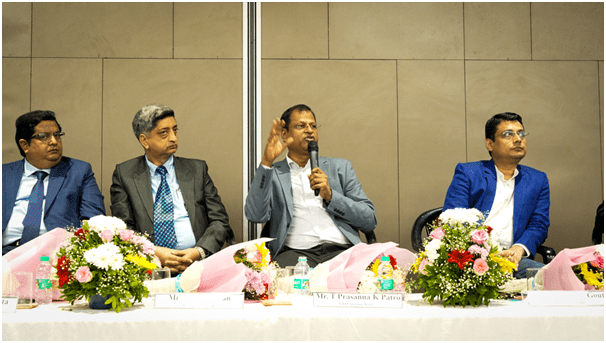
Goa Institute of Management (GIM) recently convened its CFO Roundtable, bringing together distinguished finance leaders to address ‘Challenges for CFOs in the Age of Artificial Intelligence.’ Held at the Fr Romuald D’Souza Auditorium, GIM, the roundtable provided a platform for exploring how artificial intelligence is fundamentally reshaping financial functions and redefining the CFO role across industries.
Pankaj Gupta, Group CFO at Sterling Tools Limited, addressed the human dimension of AI adoption in finance teams. He presented a compelling comparison between manual and AI-driven invoice processing workflows, demonstrating how AI automates tasks from purchase requisition to autonomous payment processing. Gupta outlined evolving skill requirements for finance professionals, noting that traditional tools like Excel and Tally must be complemented by expertise in Power BI, Tableau and AI-driven analytics. He highlighted that AI adoption varies significantly across finance roles, from 80-90 per cent in accounts payable to 50-70 per cent in investor relations, with human oversight remaining critical.
Sandeep Gouti, CFO at Zinnov, positioned AI as a strategic decision tool rather than mere automation technology. He articulated why competitive advantage depends on making faster, smarter and more precise decisions amid volatile markets and supply chain uncertainties. Gouti emphasised that AI transforms decision-making through enhanced speed, predictive capabilities, sophisticated scenario planning, and reduced bias. However, he cautioned that organisations must balance opportunity with governance, asking not just ‘what can AI do?’ but ‘should we let it do it, and how do we control it?’ His presentation underscored that whilst AI is developing, waiting for perfection would leave organisations behind competitors who began experimenting early.
T Prasanna K Patro, CFO at Ascenso Tyres, analysed the CFO’s expanding role beyond traditional finance stewardship. He identified major pain points for CFOs, including integrating AI into finance functions, balancing innovation with compliance, ensuring a return on AI investments, and managing talent transformation. Patro detailed how data governance challenges, including legacy systems and siloed data create barriers to effective AI implementation. He emphasised the CFO’s evolution into a strategic AI leader, partnering with technology executives to ensure finance remains future-ready whilst upholding ethical AI practices.
Vinod Madan, CFO at SKH Group, offered practical insights into the current applications of AI. Drawing parallels with historical resistance to calculators and computers, Madan emphasised that whilst technology evolves, organisational resistance remains constant. He presented AI tools across various categories, including financial planning, fraud compliance, and expense management. He highlighted tangible benefits, involving enhanced decision-making through real-time insights, increased accuracy, operational cost savings through automation, and improved compliance and risk management.
The discussions underscored that AI will not replace CFOs, but CFOs who leverage AI effectively will replace those who do not. Success in the AI era depends on striking a balance between automation and human judgment, i.e. Human Intelligence plus Artificial Intelligence. Furthermore, we must ensure ethical usage and position the CFO as a catalyst for digital transformation.
The CFO Roundtable reinforces Goa Institute of Management’s commitment to cultivating industry-academia partnerships that enrich management education. By bringing together senior finance executives, students, faculty, and business professionals, the event created a vital forum for understanding AI’s real-world impact on financial leadership. These conversations offered participants direct insights into how organisations are navigating technological transformation. Through initiatives like this roundtable, GIM continues to shape competent managers who understand both the opportunities and responsibilities that come with leading in an AI-driven business environment.





